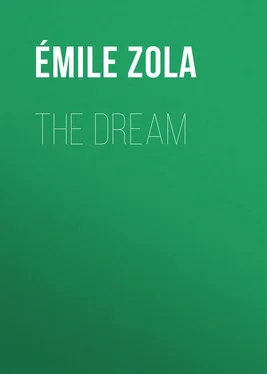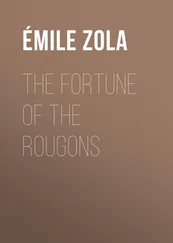Émile Zola - The Dream
Здесь есть возможность читать онлайн «Émile Zola - The Dream» — ознакомительный отрывок электронной книги совершенно бесплатно, а после прочтения отрывка купить полную версию. В некоторых случаях можно слушать аудио, скачать через торрент в формате fb2 и присутствует краткое содержание. Жанр: literature_19, foreign_antique, foreign_prose, на английском языке. Описание произведения, (предисловие) а так же отзывы посетителей доступны на портале библиотеки ЛибКат.
- Название:The Dream
- Автор:
- Жанр:
- Год:неизвестен
- ISBN:нет данных
- Рейтинг книги:3 / 5. Голосов: 1
-
Избранное:Добавить в избранное
- Отзывы:
-
Ваша оценка:
- 60
- 1
- 2
- 3
- 4
- 5
The Dream: краткое содержание, описание и аннотация
Предлагаем к чтению аннотацию, описание, краткое содержание или предисловие (зависит от того, что написал сам автор книги «The Dream»). Если вы не нашли необходимую информацию о книге — напишите в комментариях, мы постараемся отыскать её.
The Dream — читать онлайн ознакомительный отрывок
Ниже представлен текст книги, разбитый по страницам. Система сохранения места последней прочитанной страницы, позволяет с удобством читать онлайн бесплатно книгу «The Dream», без необходимости каждый раз заново искать на чём Вы остановились. Поставьте закладку, и сможете в любой момент перейти на страницу, на которой закончили чтение.
Интервал:
Закладка:
On the rare occasions when she went there, to add to the articles exposed for sale some new bands of embroidery, if she cast her eyes without, she saw through the window the same unchanging vista, the narrow street ending at the portal of Saint Agnes; a parishioner pushing open the little lower door, which shut itself without any noise, and the shops of the plate-worker and wax-candle-maker opposite, which appeared to be always empty, but where was a display of holy sacramental vessels, and long lines of great church tapers. And the cloistral calm of all Beaumont-l’Eglise – of the Rue Magloire, back of the Bishop’s Palace, of the Grande Rue, where the Rue de Orfevres began, and of the Place du Cloitre, where rose up the two towers, was felt in the drowsy air, and seemed to fall gently with the pale daylight on the deserted pavement.
Hubertine had taken upon herself the charge of the education of Angelique. Moreover, she was very old-fashioned in her ideas, and maintained that a woman knew enough if she could read well, write correctly, and had studied thoroughly the first four rules of arithmetic. But even for this limited instruction she had constantly to contend with an unwillingness on the part of her pupil, who, instead of giving her attention to her books, preferred looking out of the windows, although the recreation was very limited, as she could see nothing but the garden from them. In reality, Angelique cared only for reading; notwithstanding in her dictations, chosen from some classic writer, she never succeeded in spelling a page correctly, yet her handwriting was exceedingly pretty, graceful, and bold, one of those irregular styles which were quite the fashion long ago. As for other studies, of geography and history and cyphering, she was almost completely ignorant of them. What good would knowledge ever do her? It was really useless, she thought. Later on, when it was time for her to be Confirmed, she learned her Catechism word for word, and with so fervent an ardour that she astonished everyone by the exactitude of her memory.
Notwithstanding their gentleness, during the first year the Huberts were often discouraged. Angelique, who promised to be skilful in embroidering, disconcerted them by sudden changes to inexplicable idleness after days of praiseworthy application. She was capricious, seemed to lose her strength, became greedy, would steal sugar to eat when alone, and her cheeks were flushed and her eyes looked wearied under their reddened lids. If reproved, she would reply with a flood of injurious words. Some days, when they wished to try to subdue her, her foolish pride at being interfered with would throw her into such serious attacks that she would strike her feet and her hands together, and seemed ready to tear her clothing, or to bite anyone who approached her. At such moments they drew away from her, for she was like a little monster ruled by the evil sprit within her.
Who could she be? Where did she come from? Almost always these abandoned children are the offspring of vice. Twice they had resolved to give her up and send her back to the Asylum, so discouraged were they and so deeply did they regret having taken her. But each time these frightful scenes, which almost made the house tremble, ended in the same deluge of tears, and the same excited expressions and acts of penitence, when the child would throw herself on the floor, begging them so earnestly to punish her that they were obliged to forgive her.
Little by little, Hubertine gained great authority over her. She was peculiarly adapted for such a task, with her kind heart, her gentle firmness, her common-sense and her uniform temper. She taught her the duty of obedience and the sin of pride and of passion. To obey was to live. We must obey God, our parents, and our superiors. There was a whole hierarchy of respect, outside of which existence was unrestrained and disorderly. So, after each fit of passion, that she might learn humility, some menial labour was imposed upon her as a penance, such as washing the cooking-utensils, or wiping up the kitchen floor; and, until it was finished, she would remain stooping over her work, enraged at first, but conquered at last.
With the little girl excess seemed to be a marked characteristic in everything, even in her caresses. Many times Hubertine had seen her kissing her hands with vehemence. She would often be in a fever of ecstasy before the little pictures of saints and of the Child Jesus, which she had collected; and one evening she was found in a half-fainting state, with her head upon the table, and her lips pressed to those of the images. When Hubertine confiscated them there was a terrible scene of tears and cries, as if she herself were being tortured. After that she was held very strictly, was made to obey, and her freaks were at once checked by keeping her busy at her work; as soon as her cheeks grew very red, her eyes dark, and she had nervous tremblings, everything was immediately made quiet about her.
Moreover, Hubertine had found an unexpected aid in the book given by the Society for the Protection of Abandoned Children. Every three months, when the collector signed it, Angelique was very low-spirited for the rest of the day. If by chance she saw it when she went to the drawer for a ball of gold thread, her heart seemed pierced with agony. And one day, when in a fit of uncontrollable fury, which nothing had been able to conquer, she turned over the contents of the drawer, she suddenly appeared as if thunderstruck before the red-covered book. Her sobs stifled her. She threw herself at the feet of the Huberts in great humility, stammering that they had made a mistake in giving her shelter, and that she was not worthy of all their kindness. From that time her anger was frequently restrained by the sight or the mention of the book.
In this way Angelique lived until she was twelve years of age and ready to be Confirmed. The calm life of the household, the little old-fashioned building sleeping under the shadow of the Cathedral, perfumed with incense, and penetrated with religious music, favoured the slow amelioration of this untutored nature, this wild flower, taken from no one knew where, and transplanted in the mystic soil of the narrow garden. Added to this was the regularity of her daily work and the utter ignorance of what was going on in the world, without even an echo from a sleepy quarter penetrating therein.
But, above all, the gentlest influence came from the great love of the Huberts for each other, which seemed to be enlarged by some unknown, incurable remorse. He passed the days in endeavouring to make his wife forget the injury he had done her in marrying her in spite of the opposition of her mother. He had realised at the death of their child that she half accused him of this punishment, and he wished to be forgiven. She had done so years ago, and now she idolised him. Sometimes he was not sure of it, and this doubt saddened his life. He wished they might have had another infant, and so feel assured that the obstinate mother had been softened after death, and had withdrawn her malediction. That, in fact, was their united desire – a child of pardon; and he worshipped his wife with a tender love, ardent and pure as that of a betrothed. If before the apprentice he did not even kiss her hand, he never entered their chamber, even after twenty years of marriage, without an emotion of gratitude for all the happiness that had been given him. This was their true home, this room with its tinted paintings, its blue wall-paper, its pretty hangings, and its walnut furniture. Never was an angry word uttered therein, and, as if from a sanctuary, a sentiment of tenderness went out from its occupants, and filled the house. It was thus for Angelique an atmosphere of affection and love, in which she grew and thrived.
An unexpected event finished the work of forming her character. As she was rummaging one morning in a corner of the working-room, she found on a shelf, among implements of embroidery which were no longer used, a very old copy of the “Golden Legend,” by Jacques de Voragine. This French translation, dating from 1549, must have been bought in the long ago by some master-workman in church vestments, on account of the pictures, full of useful information upon the Saints. It was a great while since Angelique had given any attention to the little old carved images, showing such childlike faith, which had once delighted her. But now, as soon as she was allowed to go out and play in the garden, she took the book with her. It had been rebound in yellow calf, and was in a good condition. She slowly turned over some of the leaves, then looked at the title-page, in red and black, with the address of the bookseller: “a Paris, en la rue Neufre Nostre-Dame, a l’enseigne Saint Jehan Baptiste;” and decorated with medallions of the four Evangelists, framed at the bottom by the Adoration of the Three Magi, and at the top by the Triumph of Jesus Christ, and His resurrection. And then picture after picture followed; there were ornamented letters, large and small, engravings in the text and at the heading of the chapters; “The Annunciation,” an immense angel inundating with rays of light a slight, delicate-looking Mary; “The Massacre of the Innocents,” where a cruel Herod was seen surrounded by dead bodies of dear little children; “The Nativity,” where Saint Joseph is holding a candle, the light of which falls upon the face of the Infant Jesus, Who sleeps in His mother’s arms; Saint John the Almoner, giving to the poor; Saint Matthias, breaking an idol; Saint Nicholas as a bishop, having at his right hand a little bucket filled with babies. And then, a little farther on, came the female saints: Agnes, with her neck pierced by a sword; Christina, torn by pincers; Genevieve, followed by her lambs; Juliana, being whipped; Anastasia, burnt; Maria the Egyptian, repenting in the desert, Mary of Magdalene, carrying the vase of precious ointment; and others and still others followed. There was an increasing terror and a piety in each one of them, making it a history which weighs upon the heart and fills the eyes with tears.
Читать дальшеИнтервал:
Закладка:
Похожие книги на «The Dream»
Представляем Вашему вниманию похожие книги на «The Dream» списком для выбора. Мы отобрали схожую по названию и смыслу литературу в надежде предоставить читателям больше вариантов отыскать новые, интересные, ещё непрочитанные произведения.
Обсуждение, отзывы о книге «The Dream» и просто собственные мнения читателей. Оставьте ваши комментарии, напишите, что Вы думаете о произведении, его смысле или главных героях. Укажите что конкретно понравилось, а что нет, и почему Вы так считаете.












